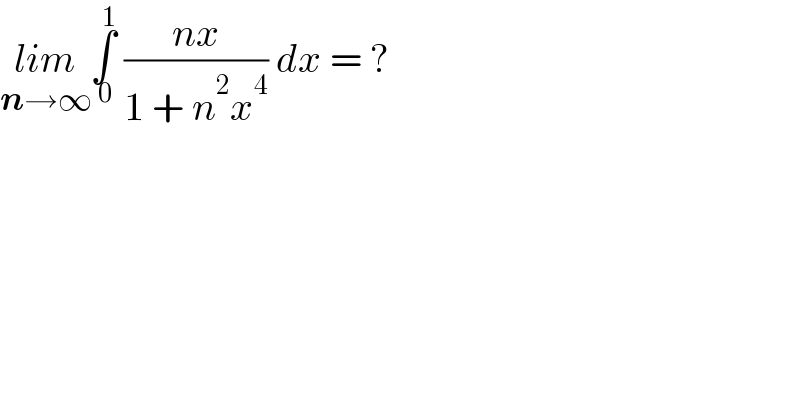Question Number 148655 by mathdanisur last updated on 29/Jul/21

$$\underset{\boldsymbol{{n}}\rightarrow\infty} {{lim}}\underset{\:\mathrm{0}} {\overset{\:\mathrm{1}} {\int}}\:\frac{{nx}}{\mathrm{1}\:+\:{n}^{\mathrm{2}} {x}^{\mathrm{4}} }\:{dx}\:=\:? \\ $$
Answered by ArielVyny last updated on 29/Jul/21

$${n}\int_{\mathrm{0}} ^{\mathrm{1}} \frac{{x}}{\mathrm{1}+\left({nx}^{\mathrm{2}} \right)^{\mathrm{2}} }{dx}=_{{nx}^{\mathrm{2}} ={t}} {n}\int_{\mathrm{0}} ^{{n}} \frac{\sqrt{\frac{{t}}{{n}}}}{\mathrm{1}+{t}^{\mathrm{2}} } \\ $$$${n}\mathrm{2}{xdx}={dt}\rightarrow{dx}=\frac{\mathrm{1}}{\mathrm{2}{nx}}{dt}=\frac{\mathrm{1}}{\mathrm{2}{n}\sqrt{\frac{{t}}{{n}}}}{dt} \\ $$$${n}\int_{\mathrm{0}} ^{{n}} \frac{\sqrt{\frac{{t}}{{n}}}}{\mathrm{1}+{t}^{\mathrm{2}} }×\frac{\mathrm{1}}{\mathrm{2}{n}\sqrt{\frac{{t}}{{n}}}}{dt}=\frac{\mathrm{1}}{\mathrm{2}}\int_{\mathrm{0}} ^{{n}} \frac{\mathrm{1}}{\mathrm{1}+{t}^{\mathrm{2}} }{dt}=\frac{\mathrm{1}}{\mathrm{2}}{arctg}\left({n}\right) \\ $$$${conclusion}\:{li}\underset{{n}\rightarrow\infty} {{m}}\int_{\mathrm{0}} ^{\mathrm{1}} \frac{{nx}}{\mathrm{1}+{n}^{\mathrm{2}} {x}^{\mathrm{4}} }{dx}=\frac{\pi}{\mathrm{4}} \\ $$$$ \\ $$
Commented by mathdanisur last updated on 29/Jul/21

$${Thankyou}\:{Ser} \\ $$$${No}\:{solution}\:\:{or}\:\:\frac{\pi}{\mathrm{4}}\:.? \\ $$
Commented by ArielVyny last updated on 29/Jul/21

$${if}\:{you}\:{have}\:{any}\:{solutions}\:{you}\:{can}\:{post}\:{sir} \\ $$$${but}\:{i}\:{think}\:{the}\:{solution}\:{is}\:\frac{\pi}{\mathrm{4}} \\ $$
Commented by mathdanisur last updated on 29/Jul/21

$${Thanks}\:{Ser} \\ $$
Answered by Ar Brandon last updated on 30/Jul/21
![L=lim_(n→∞) ∫_0 ^1 ((nx)/(1+n^2 x^4 ))dx=(1/2)lim_(n→∞) ∫_0 ^1 ((2nx)/(1+(nx^2 )^2 ))dx =(1/2)lim_(n→∞) [arctan(nx^2 )]_0 ^1 =(1/2)[lim_(n→∞) arctan(n)−lim_(n→∞, x→0) arctan(nx^2 )] =(π/4)−(1/2)lim_(n→∞, x→0) arctan(nx^2 ) No solution L oscillates within 0≤L≤(π/4)](https://www.tinkutara.com/question/Q148666.png)
$$\mathscr{L}=\underset{{n}\rightarrow\infty} {\mathrm{lim}}\int_{\mathrm{0}} ^{\mathrm{1}} \frac{{nx}}{\mathrm{1}+{n}^{\mathrm{2}} {x}^{\mathrm{4}} }{dx}=\frac{\mathrm{1}}{\mathrm{2}}\underset{{n}\rightarrow\infty} {\mathrm{lim}}\int_{\mathrm{0}} ^{\mathrm{1}} \frac{\mathrm{2}{nx}}{\mathrm{1}+\left({nx}^{\mathrm{2}} \right)^{\mathrm{2}} }{dx} \\ $$$$\:\:\:\:\:=\frac{\mathrm{1}}{\mathrm{2}}\underset{{n}\rightarrow\infty} {\mathrm{lim}}\left[\mathrm{arctan}\left({nx}^{\mathrm{2}} \right)\right]_{\mathrm{0}} ^{\mathrm{1}} \\ $$$$\:\:\:\:\:=\frac{\mathrm{1}}{\mathrm{2}}\left[\underset{{n}\rightarrow\infty} {\mathrm{lim}arctan}\left({n}\right)−\underset{{n}\rightarrow\infty,\:{x}\rightarrow\mathrm{0}} {\mathrm{lim}arctan}\left({nx}^{\mathrm{2}} \right)\right] \\ $$$$\:\:\:\:\:=\frac{\pi}{\mathrm{4}}−\frac{\mathrm{1}}{\mathrm{2}}\underset{{n}\rightarrow\infty,\:{x}\rightarrow\mathrm{0}} {\mathrm{lim}arctan}\left({nx}^{\mathrm{2}} \right) \\ $$$$\mathrm{No}\:\mathrm{solution}\:\mathscr{L}\:\mathrm{oscillates}\:\mathrm{within}\:\mathrm{0}\leqslant\mathscr{L}\leqslant\frac{\pi}{\mathrm{4}} \\ $$
Commented by mathdanisur last updated on 29/Jul/21

$${Thank}\:{you}\:{Ser} \\ $$
Commented by mathmax by abdo last updated on 30/Jul/21

$$\mathrm{not}\:\mathrm{correct}\:\mathrm{your}\:\mathrm{way}\:\mathrm{sir}..! \\ $$
Commented by Ar Brandon last updated on 02/Aug/21

$$\mathrm{What}\:\mathrm{about} \\ $$$$\underset{{x}\rightarrow\mathrm{0},\:{n}\rightarrow\infty} {\mathrm{lim}arctan}\left({nx}\right),\:\mathrm{Sir}\:? \\ $$
Answered by mathmax by abdo last updated on 30/Jul/21
![A_n =∫_0 ^1 ((nx)/(1+n^2 x^4 ))dx changement nx^2 =t give 2nxdx=dt ⇒ A_n =∫_0 ^n (dt/(2(1+t^2 ))) =(1/2)[arctant]_0 ^n =(1/2)arctan(n) ⇒ lim_(n→+∞) A_n =(1/2).(π/2)=(π/4)](https://www.tinkutara.com/question/Q148730.png)
$$\mathrm{A}_{\mathrm{n}} =\int_{\mathrm{0}} ^{\mathrm{1}} \:\frac{\mathrm{nx}}{\mathrm{1}+\mathrm{n}^{\mathrm{2}} \:\mathrm{x}^{\mathrm{4}} }\mathrm{dx}\:\mathrm{changement}\:\mathrm{nx}^{\mathrm{2}} \:=\mathrm{t}\:\mathrm{give}\:\mathrm{2nxdx}=\mathrm{dt}\:\Rightarrow \\ $$$$\mathrm{A}_{\mathrm{n}} =\int_{\mathrm{0}} ^{\mathrm{n}} \:\frac{\mathrm{dt}}{\mathrm{2}\left(\mathrm{1}+\mathrm{t}^{\mathrm{2}} \right)}\:=\frac{\mathrm{1}}{\mathrm{2}}\left[\mathrm{arctant}\right]_{\mathrm{0}} ^{\mathrm{n}} \:=\frac{\mathrm{1}}{\mathrm{2}}\mathrm{arctan}\left(\mathrm{n}\right)\:\Rightarrow \\ $$$$\mathrm{lim}_{\mathrm{n}\rightarrow+\infty} \mathrm{A}_{\mathrm{n}} =\frac{\mathrm{1}}{\mathrm{2}}.\frac{\pi}{\mathrm{2}}=\frac{\pi}{\mathrm{4}} \\ $$
Commented by mathdanisur last updated on 31/Jul/21

$${Thank}\:{You}\:{Ser} \\ $$$${but}\:{answer}:\:\:{no}\:{solution} \\ $$
Commented by mathmax by abdo last updated on 31/Jul/21

$$\mathrm{the}\:\mathrm{answer}\:\mathrm{is}\:\frac{\pi}{\mathrm{4}}\mathrm{sir} \\ $$
Commented by mathdanisur last updated on 01/Aug/21

$${Thankyou}\:{Sir} \\ $$
